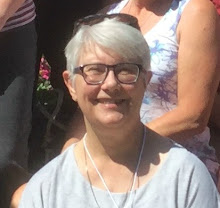Mug with GCW diploma
One of the great gifts I was given as a young weaver was the encouragement to self-assess. I had my mentor, yes, but I also attended a critique (not a criticism), had my own work critiqued as well as juried and of course, marked.
This reinforcement of looking at my own work with an eye for assessing it in order to improve was established early and it is - imho - an important step in becoming a 'better' weaver.
When I was asked to apply to teach for Olds College, I was honoured, then excited to teach students the essentials that I feel are required in order to 'master' the craft. My first year I taught level two, but after that I taught level one.
I would warn the students that level one was going to be a firehose experience and that I expected them to read the manual. I saw little point in my *only* teaching what was in the manual when there was so much more I felt a level one student needed to know. And if it was in the manual, the student could read it for themselves.
Which brings up self-assessment. While there was a component of assessment in level one, it is directed at assessing others - important if the student is going to teach, which the curriculum assumed one would, at some point, in some way.
Most of the students who came to the class were open to this approach. Others? Not so much. But I warned them on day one what was coming. Some simply were not prepared, didn't know enough, didn't have the foundation of knowledge for them to build upon. I suppose some had 'expectations' that they would be told to 'do this and you'll be perfect' when that isn't any sort of reality when it comes to mastering a craft as complex as weaving. (Or other crafts, I know, but I'm a weaver.)
One of the things I asked the students to do was include a 'letter' outlining their learning journey as they worked their way through level one with their box of homework. On day 5 I would ask the students where they thought they were in terms of knowledge level when they walked into the classroom and where they thought they were now, on day 5.
Most of the students 'got' what I was getting at and when they had all had their say, I told them about doing a 'history' of GCW master weavers and that out of all of the weavers I had contacted, the vast majority of them all said that doing the GCW tests had shown them how much more there was to learn.
So, I try to stay in 'beginner mind'. I try to not assume (too much). I try to think ahead. Extrapolate the changes I want to make with what I already know, and think through the process to begin to understand what the changes will make to my cloth. I will weave samples so that I better understand a new yarn.
The learning never ends.
"A good teacher shows you where to look, not what to see."
The Intentional Weaver was written with students who want to improve in mind, and the online seminars were further developed to support first, my Olds students, then anyone who wanted to master the craft.




No comments:
Post a Comment